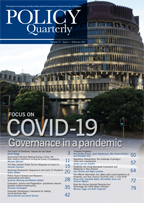The Official Information Act
Maori with Lived Experience of Disability, and New Zealand Disability Data: a case study
DOI:
https://doi.org/10.26686/pq.v17i1.6733Keywords:
disability, Maori, Official Information Act, Waitangi TribunalAbstract
This article presents a case study of the use of the Official Information Act 1982 (OIA), for research commissioned by the Waitangi Tribunal in 2018 into disability-related issues for Mäori. The responses of Crown organisations to OIA requests examined in this research highlight both issues with inconsistent application of the OIA, and limited access to information held and made available by Crown agencies for Mäori with lived experience of disability.1 The statutory time frame for responses to OIA requests was rarely met. Organisations also resisted providing information, while crucial information for ensuring equity for Mäori with lived experience of disability was often not able to be released because it was not collected at all. The impact of these limitations is discussed, particularly pertaining to core government roles of performance monitoring and ensuring accountability. In addition to querying who benefits from, and is privileged by, the OIA and its application, questions are raised around the necessary components of a legislation rewrite in order to deliver on a modern approach to official information that ensures equitable, high-performing and truly democratic public administration.
Downloads
Downloads
Published
Issue
Section
License
Permission: In the interest of promoting debate and wider dissemination, the IGPS encourages use of all or part of the articles appearing in PQ, where there is no element of commercial gain. Appropriate acknowledgement of both author and source should be made in all cases. Please direct requests for permission to reprint articles from this publication to Policy-Quarterly@vuw.ac.nz.



